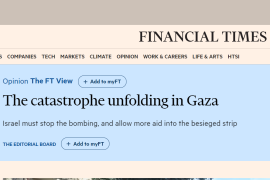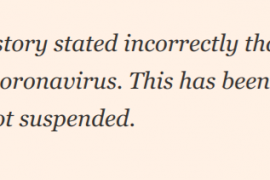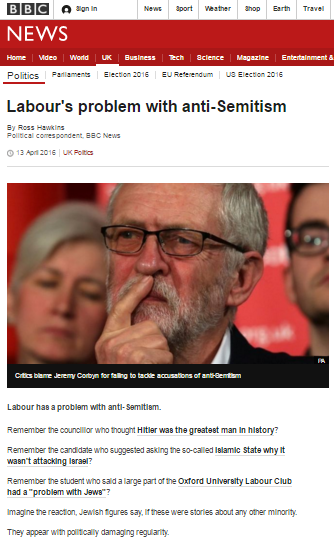A Financial Times editorial (The FT View: A spiralling cycle of violence in the West Bank”, June 27), in keeping with the outlet’s reluctance to impute agency to Palestinians, blamed Israel and only Israel for the increased violence in the West Bank this year. For instance, they wrote that “Israeli forces last week killed seven Palestinians and injured more than 90 in a raid on the city of Jenin” without mentioning that it was a raid to arrest wanted terrorists, that eight Israeli soldiers were injured and that most of the Palestinian fatalities were terrorists.
The FT also writes that “114 [Palestinians] have been killed in the West Bank this year, and Palestinians have killed 16 Israelis in the territory”, without clarifying that while almost all the Israeli fatalities were innocent civilians, the overwhelming majority of Palestinian fatalities were terrorists or males involved with violence when they were killed.
Additionally, editors contextualise Jerusalem’s recent decision to advance plans for five thousand more West Bank homes as further “encroachment across a territory that Palestinians seek as the heart of a future state“. This ignores polls showing that a meager 28% of Palestinians support an independent Palestinian state alongside the state of Israel, with a much larger number, 53%, supporting a return to armed intifada.
Further, the word “militant” (the MSM euphemism for proscribed terrorist groups such as Hamas and Palestinian Islamic Jihad) isn’t used once in the editorial which is putatively addressing the causes of instability in the region.
However, by far the most egregious distortion in the editorial is in the final paragraph:
A robust stance towards Netanyahu’s extremist government is important not just to try to quell violence in the West Bank and save what may be left of the peace process, but to send a broader message. While the situations are extremely different, Palestinians and Muslims across the Middle East note that the west has vigorously countered Russia’s seizure of parts of Ukraine, but has long been muted in its reaction to Israel’s creeping annexation of the West Bank. If the US and Europe want countries elsewhere to join their condemnation of Moscow, they must avoid appearing hypocritical by failing properly to condemn unacceptable behaviour when it comes from a traditional ally.
Though acknowledging that the “situations are extremely different”, editors’ decision to legitimise the absolutely risible analogy between Russia’s invasion of Ukraine and potential Israeli construction of homes across the green line demonstrates either their cynicism or an appalling lack of intellectual rigor when examining the conflict.
On Feb. 24, 2022, Russia launched a completely unprovoked invasion of a sovereign country, representing the second Russian invasion of Ukrainian territory in less than a decade. Vladimir Putin’s aim was to erase Ukraine as an independent nation.
Since then, Russian military forces have reportedly engaged in mass atrocities against Ukrainian civilians, including “extrajudicial and summary executions, enforced disappearances, torture, rape and other forms of sexual violence”, as well as “the forcible transfer and deportation to the Russian Federation of inhabitants, particularly children from territories in Ukraine occupied under the effective control of [Russia]”. Though Moscow’s military efforts have thus far not succeeded, for Ukraine the stakes are existential – the question of whether their nation will continue existing.
Unlike Ukrainian territorial sovereignty, which is internationally undisputed, Israel took control of disputed territory in the West Bank and east Jerusalem – which had been illegally occupied by Jordan, but which Palestinians never had sovereignty over – amidst a defensive war against Arab nations who sought the Jewish state’s destruction.
As the result of the Oslo Peace Process, all the major Palestinian population centers – what’s known as Area A – are under the control of the Palestinian Authority. Settlement construction, by contrast, is confined to area C, where, again, per the Oslo Accords, signed by PA leaders, Israel exercises complete control. Moreover, the main settlement blocks (Gush Etzion, Ma’ale Adumim, Givat Ze’ev and Ariel, as well as all Jewish neighborhoods in east Jerusalem) are in areas that even Palestinian leaders conceded would remain part of Israel in the event of a two-state solution.
Since Oslo, PA leaders rejected multiple peace offers by Israeli leaders that would have created a Palestinian state in Gaza, east Jerusalem and almost all of the West Bank. Meanwhile, Palestinian extremists have done their best to torpedo any hopes for Palestinian statehood by continuously launching deadly terror attacks against Israeli civilians, including from territory (like Gaza) where Israel withdrew from, souring Israelis on the assumption that further territorial withdrawals will necessarily bring peace.
This is the context by which to understand Jerusalem’s continuing control of territory in Judea and Samaria – decades of war, terror and Palestinian rejectionism amidst a complex territorial dispute with no easy answers, a conflict which literally has zero parallels with the brutal military aggression and expansionism of the authoritarian Russian regime.






Solution must be found to this unending circles of violence. It can’t continue like that forever.
We see the contagious journalistic carcinoma has quickly spread to the FT from other effluent ridden media outlets #journalism is dead